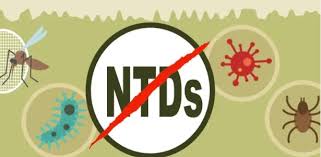By Hajara Leman
Neglected Tropical Diseases (NTDs) remain one of the world’s biggest health problems.
They quietly affect more than a billion people, especially those living in poor and rural areas.
These diseases, such as river blindness, elephantiasis, schistosomiasis, and worm infections, spread easily in places with poor sanitation, limited healthcare, and high poverty.
Though these diseases can be prevented and treated, they have been ignored for many years, leaving millions suffering from sickness, disability, and poverty.
The World Health Organisation (WHO) provides insights.
“NTDs are a diverse group of conditions caused by a variety of pathogens (including viruses, bacteria, parasites, fungi and toxins) and associated with devastating health, social and economic consequences.
“NTDs are mainly prevalent among impoverished communities in tropical areas, although some have a much larger geographical distribution.
“It is estimated that NTDs affect more than 1 billion people, while the number of people requiring NTD interventions (both preventive and curative) is 1.495 billion,’’ WHO said.
In Nigeria, many states are still fighting NTDs, but Gombe State is showing strong progress and bringing hope in the fight against these diseases.
The Gombe State Government, together with the Federal Ministry of Health, UNICEF, and other partners, has shown strong commitment to ending NTDs.
Through mass drug distribution, community education, better sanitation, and ongoing health campaigns, the state is getting closer to eliminating these diseases completely.
During a recent media dialogue in Gombe, health officials and partners commended the state’s achievements.
Officials from the Federal Ministry of Health said the progress was a major milestone for the North-East and expressed hope that Gombe could become totally free of NTDs before 2030.
Hajiya Hauwa Abubakar, the North-East Zonal Coordinator for NTDs, said Gombe had made “remarkable progress” in fighting these diseases.
She commended the commitment of the state government, the Federal Government, and partner organisations.
She said their teamwork was improving public health in the region.
Abubakar said that removing NTDs from Gombe would improve the lives of both children and adults and also support the state’s economic growth.
She explained that ending NTDs would help children learn better because they would no longer be held back by sickness.
Abubakar said that the diseases mostly affected the poorest communities.
She said that eliminating them would reduce poverty, improve health, and support several United Nations Sustainable Development Goals (SDGs).
UNICEF’s Chief of Field Office in Bauchi, Dr Nuzhat Rafique, commended Gombe’s financial support and commitment to NTD programmes.
She said the progress was encouraging but urged continued investment to protect children and women.
Rafique said Gombe was close to reaching the “transmission breakpoint” for some NTDs—a point where the diseases could no longer spread easily.
She said that journalists had a role in raising awareness and encouraging healthy behaviour.
Dr Mustapha Musa, Director of Disease Control and Immunisation in Gombe State, said that all local government areas except Akko and Kwami were free of NTDs.
He credited this success to hardworking health workers, strong support from partners, and community involvement.
UNICEF’s National NTD Consultant, Mr Hilary Adie, explained how NTDs affected children.
He said that when a parent suffered from river blindness, a child might have to guide them, which affected the child’s growth and opportunities.
Adie said that the disabilities caused by NTDs placed a heavy burden on countries and prevented many people from reaching their full potential.
Experts say Gombe can maintain its progress by continuing to create awareness in communities, making sure people understand prevention methods and the importance of taking their medication.
They also suggest that the government and partners should keep providing enough funding for NTD programmes so that the gains already made are not lost.
“More trained health workers are needed to help with treatment, monitoring, and community education.
“Improving sanitation, such as access to clean water, toilets, and proper waste disposal, will also help stop these diseases from returning.
“Regular monitoring and surveys should continue so that any new cases can be detected early.
“Involving schools, traditional leaders, and community groups will also help spread correct information and encourage more people to participate in prevention activities,’’ a health expert said.
Observers say Gombe State has made great progress in the fight against Neglected Tropical Diseases, giving hope to many communities.
With strong support from the government, partners, health workers, and local residents, the state is moving close to eliminating these diseases completely.
Continued awareness, reliable funding, and active community involvement are needed to protect the progress already made.
Gombe’s success, stakeholders say, shows that with commitment and teamwork, long-standing health challenges can be overcome, and future generations can look forward to healthier lives.(NANFeatures)
***If used, please credit the writer and the News Agency of Nigeria.












